The recent tragic disappearance of a worker from a floating offshore drilling rig in the North Sea has highlighted concerns UK authorities have insufficient powers to regulate the safety of vessels operating in the UK’s offshore oil, gas and renewables industry.
Opinion
Offshore oil, gas and renewables: time to close the regulatory void
On Sunday 22 January 2023, the alarm was raised on the offshore jack-up drilling rig, ‘Valaris 121’, when a member of the rig crew was reported missing. The rig was under tow at the time, about 100 miles off the east coast of Scotland and heading for the port of Dundee, having completed works for its oil company client, Harbour Energy. This tragic event brought into sharp focus the concerns RMT has had for some considerable time, that workers on ‘vessels’ in certain circumstances are out of the scope of the regulatory regime of the UK – they are effectively working in a ‘regulatory void’.
While the drilling rig Valaris 121 was sitting on the seabed and attached to an oil and gas well, the ’installation’ was regulated by the Health and Safety Executive’s (HSE’s) Energy Division and subject to the Offshore Installations (Offshore Safety Directive) (Safety Case Etc.) Regulations 2015. However, once disconnected from the well and off the seabed under tow, the rig became a ‘vessel/ship’ and as such became subject to maritime law.
 Darren Procter: "Government intervention and regulatory change are needed so offshore workers are not trapped in this ‘regulatory void’."
Darren Procter: "Government intervention and regulatory change are needed so offshore workers are not trapped in this ‘regulatory void’."
The Valaris 121 was registered under the maritime flag state of Liberia. The ‘vessel’ was outside the UK’s territorial waters (12 nautical mile limit) and was considered to be in ‘international waters’ – meaning the UK maritime health and safety authorities, the Maritime and Coastguard Agency (MCA) and the Maritime Accident Investigation Board (MAIB), had no jurisdiction. The responsibility for investigating the circumstances of this poor worker’s disappearance/death therefore lies with the vessel’s flag state, in this case the State Authorities of Liberia.
Government intervention is required
The RMT trade union has been trying to highlight our concerns about a ‘regulatory void’ in the UK’s offshore oil, gas and renewables industry with regulators and government alike for several years. Sadly, it has taken the tragic death of a worker to finally attract some degree of ‘interest’ from the regulatory authorities. While this is welcomed, we must accept that the regulators themselves cannot address the situation. It will require government intervention and regulatory change to ensure workers are not trapped in this ‘regulatory void’ – and we need that intervention very soon.
All around the UK coast activity levels are increasing as the renewables sector ramps up developments. At this moment in time, we are assured by HSE that it regulates all wind turbines and activities on these structures fall under the Health and Safety at Work Act 1974 (HSWA). Whether the regulatory and enforcement model is robust enough is questionable in our opinion. The HSE offshore renewables team consists of a grand total of three inspectors! We question whether it is credible to have a total of three inspectors assigned to this critical part of the UK’s efforts to decarbonise and ensure UK energy security via electricity generation, but that is a debate for another time perhaps.
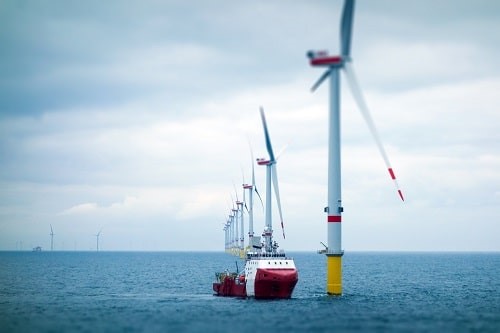 Where vessels are operating outside the 12 nautical mile limit of UK territorial waters – or are flying a flag of a foreign state – they are not covered by the UK maritime regulatory authorities. Photograph: iStock
Where vessels are operating outside the 12 nautical mile limit of UK territorial waters – or are flying a flag of a foreign state – they are not covered by the UK maritime regulatory authorities. Photograph: iStock
The RMT’s concern for now relates to the workers on the ever-growing number of vessels operating in the UK’s offshore renewables sector. These vessels are not covered by HSE, and they are not subject to the HSWA.
Where vessels are operating outside the 12 nautical mile limit of UK territorial waters – or are flying a flag of a foreign state – they are not covered by the UK maritime regulatory authorities. There are vessels undertaking the installation and construction of wind turbines, there are support vessels, cable layers, crew transfer vessels, ‘walk to work’ vessels, guard vessels and many more.
Workers on these vessels are commonly referred to as the ‘project crews’, meaning they can be anything from catering and hotel staff, through to riggers, scaffolders and welders, and technicians responsible for maintaining operational wind turbines. The maritime authorities say these workers are not “seafarers”, so any shred of protection that might be drawn from other provisions, such as the Maritime Labour Convention, are not applicable either.
Reactive legislation ‘only follows a tragedy’
Are we going to wait for a tragic event, and adopt the ineffectual approach that is used all too often in the UK, where reactive legislation is only introduced after a clearly foreseeable tragedy occurs? Are we going to wait until a tragedy occurs, where the lives of seafarers and project crew on vessels supporting the renewables sector are lost, and then ask why those workers had no protection and fell outside the scope of the regulatory structures? Must we wait to ask why no company can be held accountable, why no prosecution can be brought and why the families of the individuals lost have no recourse for justice after the fact?
As recently as March 2022, we all witnessed first-hand how poorly maritime operators can treat workers, when P&O Ferries sacked 800 workers on a video call one morning. We also subsequently witnessed the chief executive of the company confirm to a parliamentary inquiry that he had “broken the law” and would do it again if required.
This was in relation to employment law, where laws and protections actually exist in the UK, although the UK government did nothing in response to the company’s actions. However, the concerns the RMT is highlighting about a ‘regulatory gap’ in the UK’s offshore oil, gas and renewables industry relate specifically to the health and safety of workers, where no laws or protections currently exist.
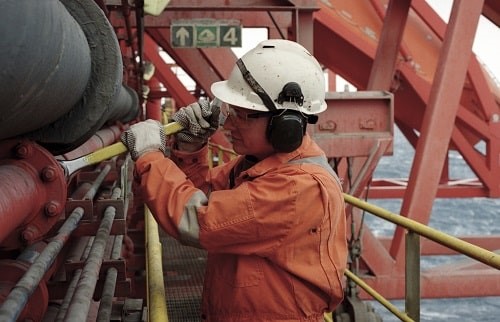 Workers on these vessels are commonly referred to as the ‘project crews’, meaning they can be anything from catering and hotel staff, through to riggers, scaffolders and welders, and technicians. Photograph: iStock
Workers on these vessels are commonly referred to as the ‘project crews’, meaning they can be anything from catering and hotel staff, through to riggers, scaffolders and welders, and technicians. Photograph: iStock
A proactive approach to address this regulatory void is needed as a matter of urgency
The UK developed a tried and tested set of regulations and legislation for the oil and gas sector after the death of 167 workers on the Piper Alpha offshore oil platform in the North Sea in 1988. The RMT believes much of the regulatory ‘pack’ developed in the aftermath of Piper Alpha could be extended and/or adapted to ‘offshore energy project vessels and structures’. We believe this could be achieved relatively easily if the political will was there. All parties on a project could be subject to the provisions of a generic ‘safety case’ model, covering all aspects of the operations to be undertaken. This could include the generic elements – such as the prevention of fire, explosion and emergency response arrangements; management and administration; first aid; safety representatives and safety committees; and, of course, health and safety at work. Project specifics could then be ‘bolted on’ as project policies and procedures.
Ironically, while it is evident there is a regulatory void, we still have standards organisations developing health and safety training for the UK offshore oil, gas and renewables sector. Bodies such as the Global Wind Organisation claim to be leading the development of a wide range of training standards to meet the requirements of the sector.
But what are the training requirements of a sector where a regulatory void exists? Who set these training standards and what have they been measured against to demonstrate they are fit for purpose? Were regulators, the workforce and workforce representatives involved in the development of these standards?
RMT can categorically state that no regulatory authority, workers, safety representatives or trade unions were ever engaged in the process of developing these training standards. So these training ‘standards’ are another ‘void’ in the development of health and safety practice for the sector.
HSE issues improvement notice after inspection
The Valaris 121 did go into the port of Dundee and HSE has since gone to the rig. This was after Police Scotland had completed their investigation, which was essentially to ensure no ‘crime’ had occurred. As a result of HSE’s visit, HSE issued an improvement notice in relation to polymer floor gratings after discovering a section of floor grating had dislodged, creating a potential for tripping, or falling, through a hole in the deck area. HSE was able to do this because the rig came into the Scottish port. However, if the rig had gone to a port outside the UK there would have been no such HSE inspection.
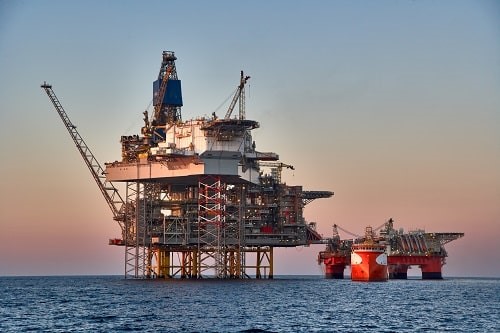 RMT will continue to campaign for change to ensure that offshore energy workers when leaving home to join their respective vessel or installation, will know what safety standards are applicable. Photograph: iStock
RMT will continue to campaign for change to ensure that offshore energy workers when leaving home to join their respective vessel or installation, will know what safety standards are applicable. Photograph: iStock
At this moment in time, if a vessel supporting a renewables project suffers a catastrophic event (God forbid) there will be no HSE inspection and no UK maritime authority will investigate. Instead, the state authorities of Panama, the Marshall Islands, Liberia – or whichever state is reflected by the flag flying above the vessel – will be the responsible authority for carrying out an investigation and making recommendations to prevent a recurrence. That state will also be responsible for any legal proceedings if a failure is identified. Any proceedings, criminal or civil, will have to be held in the relevant flag state.
Is this how we propose to regulate this critical sector of industry and protect the thousands of workers employed in it? RMT believes the workers across the offshore energy sector and their families deserve better, and for this reason we will continue to campaign for change to ensure that offshore energy workers when leaving home to join their respective vessel or installation, will know what safety standards are applicable and that they have protection in place – irrespective of the work that the vessel or installation is carrying out around the UK coast.
There must be a linkage between the licensing of contracts and the protection of workers within the offshore energy sector for safety and employment standards. And the question must be asked as to why this government is failing to address this void and leave offshore energy workers and seafarers within the renewables sector without protection.
HSE’s safety alert on the unsafe use of floor grating systems in oil and gas, and wind generation, is at: hse.gov.uk/safetybulletins/floor-grating-systems.htm
For more information on the RMT’s work see:
rmt.org.uk
Darren Procter is National secretary at the RMT
OPINION
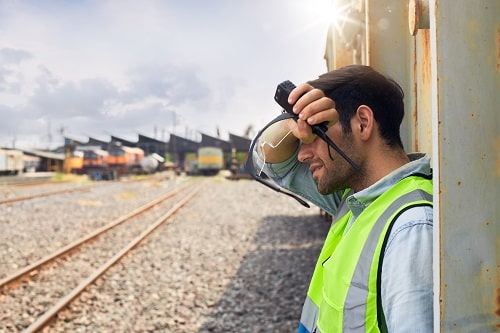
Heat at work: a silent killer
By Halshka Graczyk and Lacye Groening, ILO on 07 April 2025
Workers across the world are increasingly being exposed to excessive heat with serious implications for their safety and health. It is therefore vital that governments, employers and workers’ organisations develop, share and implement practical and low-cost strategies and measures for effectively reducing the risk from heat stress at work.

Making good work the foundation
By Mike Robinson FCA, British Safety Council on 07 April 2025
In 2024, for the first time, the UK dropped out of the list of the top 20 happiest countries: according to the World Happiness Index. This year, the UK rests in 23rd place, slightly ahead of the US and behind the Nordic countries, Germany, the UAE and others.
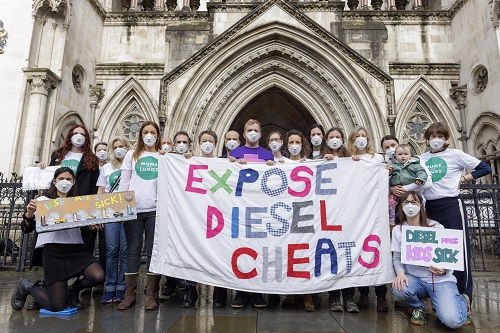
The air we share: why tackling pollution protects us all
By Scott Paul, Mums for Lungs on 04 April 2025
Air pollution is often invisible; its impact is anything but. Whether you’re a parent worried about your child’s lungs, a construction worker breathing exhaust fumes, or a commuter passing through busy streets, polluted air is everyone’s problem.



